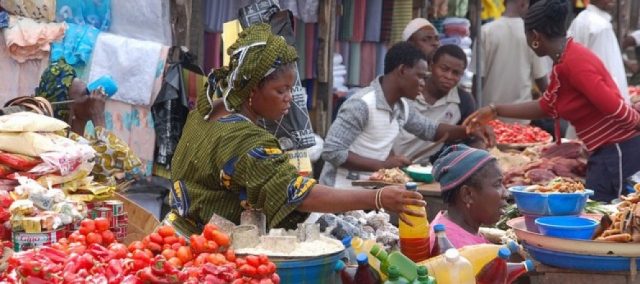
MON, 22 AUG, 2022-theGBJournal| Food prices rose significantly in July, according to the National Bureau of Statistics (NBS) report- Selected Food Prices Watch for July- recently published.
The elevated food prices also mirror the spillover effect of increased transport costs on food prices and lingering currency pressure on import costs and insecurity.
The price of beans, tomatoes, beef, rice, Groundnut oil etc all went through the roof in July.
Predictably, in July, food inflation (22.02% y/y vs June: 20.60% y/y) rose to its highest level since May 2021 (22.28% y/y). The increased food prices were primarily driven by the unfavourable base from the prior year’s corresponding period.
The price pressures were significant across the farm produce (+150bps to 22.39% y/y), processed food (+139bps to 21.91% y/y) and imported food (+7bps to 17.91% y/y) sub-baskets.
Notably, we highlight that imported food prices are at their highest levels since March 2017 (18.14% y/y).
According to the NBS report, the average price of 1kg of beans (white, black eye, sold loose) in July 2022 was N547.38, an increase of 23.22% from N444.21 in July 2021. On a month-on-month basis, this increased by 2.09% from N536.17 in June 2022.
The average price of 1kg of Tomato in July 2022 was N446.81, an increase of 7.71% from N414.83 in July 2021. On a month-on-month basis, the average price of this item increased by 1.94% from N438.33 in June 2022.
Similarly, the average price of 1kg beef (boneless) in July 2022 was N2,118.84, an increase of 27.58% from N1,660.76 recorded in July 2021. This price rose by 1.87% on a month-on month basis. In addition, the average price of Groundnut oil: 1 bottle, specify bottle stood at N1,078.17 in July 2022, showing an increase of 40.24% from N768.81 in July 2021. On a month-on-month basis, it rose by 1.44% from N1,062.90 in June 2022.
The average price of 1kg Rice (local sold loose) in July 2022 was N467.80, indicating an increase of 13.55% from the value recorded in July 2021 (N411.97). On a month-on-month basis, it decreased by 4.27% from N488.68 recorded in June 2022. Also, the average price of Palm oil: (1 bottle, specify bottle) stood at N890.67 in July 2022, showing an increase of 40.19% from N635.31 in July 2021. It grew by 2.27% on a month-on-month basis.
On state profile analysis, Ebonyi recorded the highest average price of beans (white, Black eye, sold loose) in July 2022 with N900.51, while the lowest was recorded in Borno with N317.73.
The highest average price of Tomato 1kg was recorded in Edo with N799.16, while the lowest was recorded in Taraba with N159.14. In the same way, Rivers recorded the highest price of 1kg Rice (locally sold loose) with N619.62, while the lowest was recorded in Jigawa with N363.34.
Analysis by zone showed that the South-East recorded the highest average price of Beans ‘’brown sold loose” with N853.19, followed by the South-West with N598.00, while the NorthEast recorded the least with N379.03.
Likewise, the South-East recorded the highest average price of Tomato with N678.80, followed by the North-West with N656.93, while the lowest was recorded in the North-East with N194.72.
The average price of 1kg Rice (local sold loose) in the North-West was N796.03, representing the highest recorded in July 2022, followed by the South-West with N519.64, while the North-Central had the lowest with N401.72.
Although the Southern parts of the country continue to enjoy the green harvest, the Northern region is currently experiencing the lean season as they await the commencement of the harvest season in September. Besides, transport costs continue to increase, negatively affecting food prices amidst an increased cost of farming tools.
That said, Cordros Research analysts say they believe the moderation in global food prices, as seen from the FAO World Food Price Index (-8.6% m/m), bodes well for food inflation in the short term.
‘’Therefore, on balance, we expect food prices to rise by 2.03% m/m in August, translating to a y/y reading of 23.19%.’’
Twitter-@theGBJournal| Facebook-The Government and Business Journal|email: gbj@govbusinessjournal.ng|govandbusinessj@gmail.com









